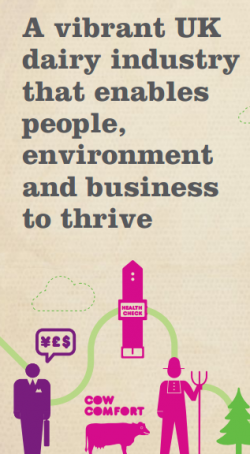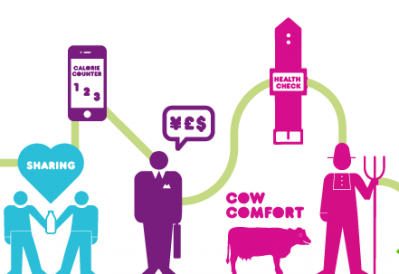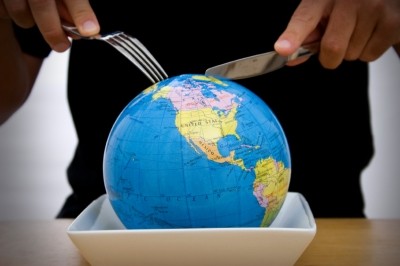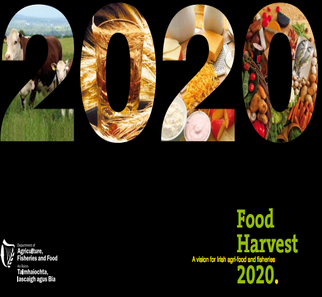WEEKLY COMMENT
Fine words and cartoon cows: ‘ambitious’ UK dairy vision must be backed by cash

I need an eye test. We’ve had Coca-Cola Vision 2020, Friesland Campina’s route2020, and now Dairy 2020 – which is described by non-profit ‘facilitator’ Forum for the Future as an ‘ambitious’ strategy document for the future of sustainable UK dairy, launched at the House of Commons on April 16.
The British also seem to have a particular aptitude for consulting and producing ‘vision’ documents, while time might be better spent, say, making real things or regulating our banks.
Perhaps (on a cynical reading of the situation) we’re so blinded by a blizzard of vision documents that we need another vision document to clear our rainy skies.
'Strange and wearisome' visions
As a journalist these initiatives are often strange and often wearisome things to cover – seaming together a patchwork of anodyne quotes from assorted players that seem like an accord of the United Nations, to produce something that says very little in a highfalutin kind of way.
Here’s the introduction to Dairy 2020: “The dairy industry is a vital part of the broader food system: its products have the potential to deliver key nutritional benefits to people, contribute to a vibrant sustainable farming industry in the UK, and deliver economic benefits across the supply chain.” OK.
Then a slice of apple pie: “This isn’t a map…it is a framework made up of guiding principles that will help us orientate our way through the complexities and challenges we are already being faced with. It marks the beginning of the process, not the end.”
OK, now I’ll slam this article into reverse - can you hear the gears crunching? I’ll admit that Dairy 2020 does have its merits, although it remains to be seen how its ‘guiding principles’ work on a practical level.
These are: (1) looking outward (2) innovating and investing (3) working together (4) building skills and attracting talent (5) engaging consumers (6) minimizing environmental impact (7) stewarding nature (8) improving animal welfare.
Current endorsees (there are 18 in total) include DairyCo, First Milk, Dairy UK, Volac, the University of Nottingham, and on the retail side Sainsbury’s, Waitrose and Asda.
Taking principle 2 alone, endorsees subscribe to “actively investing in technology, science and business models which deliver superior nutrition, improved environmental outcomes and long-term economic value. Fostering a dynamic, entrepreneurial culture for competitiveness on a global and local scale.” But where is the detail?
Broad brushstrokes
Perhaps I’m missing the point, which is that such strategy documents – long on broad brushstrokes, short on detail – are valuable because they group together the issues that everyone in the supply chain is aware of, and hymns together a response to them – like individual instruments in an orchestra.
James Neville, chair of Dairy 2020, and dynamic managing director of proud British dairy firm, Volac, hailed a “credible coalition” of farmers, processors, retailers and suppliers.
“Prior to Dairy 2020, there was a lack of integrated strategy in place in the UK dairy industry,” Neville said.
“This gives us the confidence to start work on improving the overall sustainability of our industry: to produce more for less, to grow exports, or increase our competitiveness in our domestic market to gain share. The biggest symptom of this is our annual dairy trade deficit of ₤1.2bn.”
Good stuff. But at the same time, fine words and vision documents are a solid start but can only take us so far along that road.
Today, Lord Browne (former CEO of BP) is quoted in The Telegraph complaining that the UK lags behind competitors in “translating the fruits of our scientific research into commercial success”, with little spent on commercialising ideas, which then migrate abroad.
Germany spent 2.5% of GDP on scientific R&D in 2007, while Japan spent 3.4% and France 2.1%, all well above the UK level of 1.8%.
So couldn’t the government simply spend more on targeted R&D and supporting essential industries such as dairy, rather than relying on the plucky, often penniless British entrepreneur?
Melanie Leech, director general of the Food and Drink Federation (FDF) said last November that UK CEOs told her that the government should show greater preparedness to put its money, influence and regulatory frameworks behind UK food manufacturing.
As for Dairy 2020, we await endorsements from the likes of Arla Foods, Danone, PepsiCo International, Tetra Pak, Tesco and other major players. All formed part of the Dairy 2020 working group but have yet to bless the vision document.
Ben Bouckley is a deputy online editor for William Reed Business Media and writes for DairyReporter.com







